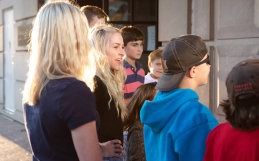Resiliency is the ability to deal with life’s challenges and changes. Through the Kids 4 Kids Leadership Program, I teach children strategies that they can use to deal with negative situations positively. By giving children the tools to deal with negativity, I am also helping them develop confidence and resilience as they will have the means to use life’s changes successfully as tools they can utilize in their leadership journey.
I have worked with children who have faced extreme life challenges. The one thing that amazes me is how resilient and confident these kids are. The question is: “How are these children so resilient?”
BEAUTY – Sarah’s Story: I met a young 7-year-old girl named Sarah at a Leadership Day I was offering at the Hospital for Sick Children in Toronto. She was born with a facial cranial difference. Her face was deformed, with many scars etched into the surface. We were involved in a game of dodgeball when Sarah arrived. She exploded into the room with the statement:
“I don’t look like any fairy princess, but I am a pretty cool kid. What are you guys doing? Dodgeball? Hey, I’m in!”
She got right into the game. The kids were checking her out, and when we began discussing differences, she explained why she looked the way she did. Then she said something profound. She said:
“When you get to know me, you will see how cool I am, and all want to be my friend.”
She was right. By the end of the day, everyone in the room wanted to be friends with Sarah. She was magnificent. She figured out that she couldn’t change her situation, but she definitely could use it to help others see the importance of seeing that true beauty comes from within.
I SEE POTENTIAL– Byron’s Story: I was running a program at Pleasantville Public School in Richmond Hill, Ontario, when I met a boy named Byron. His mother told me Byron was a little clumsy but resilient and could bounce back quickly. I had never met a kid like Byron. He was running into walls, tripping, banging into other children and even ran into the girl’s changing room. I called Byron over to see what was going on. I noticed that his eyes were moving erratically. I asked him if there was something he forgot to tell me. He confessed that he was blind and was afraid that if I found out, I would not allow him into Kids 4 Kids. I guess this was the response he had received from other clubs. Byron stayed with Kids 4 Kids for seven years. I only had to help him when we were outside; otherwise, he could cope.
THE QUESTION
So, back to the question. How do kids who have apparent challenges become so resilient?
The Answer
All of these children have parents or significant adults in their lives who are supportive and who listen. These children are not given special treatment because of their challenges. They are taught to use their challenges to teach, challenge themselves, and grow into their best version. A Harvard study found that: “every child who winds up doing well has had at least one stable and committed relationship with a supportive adult.” These adults deliver a positive, adaptive response in the face of significant adversity. This gives children the ability to feel that they can master the situation.
Resilience helps children deal effectively with bullying, detractors and negative life situations.
READING
Resilience helps us all deal with negative situations. It gives us strength and the courage to use as tools instead of something that weighs us down. It is an opportunity to build character.
In grade 7, I read at a grade 4 level. I was never more the average student. I never felt that my teachers had a lot of faith in my ability to improve. I was called DUMB by the bullies and felt pretty dumb as my brothers and sister could read. Why couldn’t I?
I had to make a choice. I would stay average and remain a poor reader or do something about it. I chose the latter. I enrolled in a pilot program which involved a college student named Evelyn Bagchus, who met with me at the school and tutored me once a week. Within a few months, I no longer read at a grade 4 level. I was now assessed at a grade 9 level. It was such an achievement that I got my face on the front page of the Montreal Star. I used the situation as a tool to improve my reading and build my resiliency.
THE YUKON
When I was 16 years old, I took part in a program called Exchange Canada. I could choose a type of community in Canada to visit for a month. I chose the Arctic. I flew from Montreal to Toronto, Vancouver, Fort St. John, Watson Lake, and Yukon. First of all, I am a very nervous flier. I had never been away from my parents and had to navigate this journey alone. I decided to go for it. I took action! I had to change planes at every stop. I was a little nervous getting on Japan Express to Vancouver but ended up at my destination. When I got up to Fort. St. John, my ticket said Grande Prairie. Fortunately, I did realize that this was in Alberta, and I had to problem-solve my way through this predicament. I stayed in Watson Lake for a month, went to school and worked at a truck stop. When I got home from my trip, I had confidence I had not had before. Again, my parents always supported my interests. They knew that the experiences that I pursued would make me stronger. My parent’s support and encouragement were important factors in building my resilience.
UNIVERSITY
After high school, I had to decide whether or not to go to post-secondary education. I was an average student and was told that whatever marks I got in high school would inevitably be worse in university. By this point in my life, I knew I had ADHD (Attention Deficit with Hyperactivity and a Learning Disability). This time, the question is: “Would I be wasting my time going to university?” I decided that I should at least try. I was accepted into York University for their Fine Arts program. Even though I wasn’t great academically, I was creative. I can excel at the arts. It was my moment of truth. I had just received my first report card from the university. Would it be a dismal failure or an opportunity to prove to myself that I wasn’t dumb, a word that still affects me today? I opened the letter revealing that my marks were A’s and B’s. Taking action and pushing myself through the discouragements gave me this success I could build on. Fear of trying something new and not trying is the killer of resilience.
CHANNEL 5
After my first year of university, I was approached by an established rock band named Channel 5 to be their lead singer. They had a record out and looked like they were headed for success, so I decided to work with them during the summer and decide what to do after that period. I ended up being in Channel 5 for six years. We won the Q107 Homegrown Contest twice, recorded with Paul Northfield, who was David Bowie and the Police’s sound engineer and had many exciting opportunities. We never did become a huge success, but being a frontman in a band helped me build my confidence and increase my resilience. It is important to encourage children to pursue their passions as this is where they will find themselves, their purpose, and their confidence and build their resilience.
BECOMING AN AUTHOR
After years of storytelling, I was encouraged by a boy named Sam to put my stories into a book. I thought it may be a great way of documenting my stories, so I wrote a book called, “The Fantastical Town of Finkle.” It was a collection of the short stories I had told children for years. I could not believe the response from the children. They loved the stories, which encouraged me to write additional books. To date, I have written six books, produced a mini-movie and was part of a documentary on my work entitled “Life Fantastical.” To build confidence and resilience in children, we need to teach them that when you pursue an interest, that interest will lead you to additional opportunities that will be the source of your growth.
KIDS 4 KIDS LEADERSHIP
I established Kids 4 Kids Leadership to help students deal with bullying. I was told that it was unlikely that kids would want to come to a program that taught them how to deal with bullying. I chose 15 students, promised them pizza and gave it a go. The kids seemed to enjoy the program, so I offered it for a second round. I had 179 students sign up, and the rest is history. I have had over 25,000 children go through my programs and camps. The program process of being successful with Kids 4 Kids has contributed a lot to my confidence and resiliency. It has been my resiliency that has helped me grow my vision.
I have had to deal with many supporters but many detractors. I have had principals who denied me access to their school as they were worried that having an anti-bullying program in their school may lead people to believe there was a problem with bullying in their school. Their union head told Child and Youth Workers to phone the school board if I was seen in their school as they felt threatened by my work. I had to fight to offer a free anti-bullying conference. I heard things like: Who does he think he is? What qualifications does he have? It’s not his job! These are all statements from individuals focused on their egos and not the needs of students.
Dealing with all this negatively was frustrating but empowered me to focus on my purpose. Reframing the hatred into the reason for what I do helps me increase my resilience. It is vital to help children understand there will be detractors in their lives. However, when they appear, it is a sign that they are on the right track and are to reframe the negativity to their purpose.
THE MERITORIOUS SERVICE MEDAL – GOVERNOR GENERAL OF CANADA
Building resilience and confidence will lead to opportunities. I recently received the Meritorious Service Medal from the Governor General of Canada. This meant a lot to me as it demonstrated that no matter what obstacles a person faces if they take action, push through obstacles, and use challenges as tools, they can reach their potential. Awards are opportunities to acknowledge the people who have helped you achieve your goals. If it weren’t for the numerous parents, teachers and administrators, Kids 4 Kids would never be as successful as it has become. Help children realize that success is never achieved alone.
LIFE CHALLENGES
Life can be challenging, and sometimes, it presents us with difficult challenges. We must teach children to look at these challenges as opportunities to learn, grow, and build resilience. When challenges enter your life, you can let them stop you from growing or push through them. There are no other choices: Defeat the challenges or let them defeat you. Children who realize they can use the challenges to grow will likely build their resilience. They risk becoming stagnant if we allow them to persevere on the negative.
Scott’s Story
I met Scott when he was seven years old. At the age of 5, Scott’s dad was murdered. At a Kids 4 Kids session, we were discussing life challenges. Scott stood up and told the group what had happened to his dad. He continued telling the kids that he could use this situation to help other children who deal with loss. He turned the negative life challenge into a powerful tool to inspire, motivate and teach.
FAILING FORWARD
I’ve attached a quote from John Maxwell, the world’s number-one leadership guru.
Children need to be taught that it is OK to fail. Failing brings growth and opportunity. Without failure, we stay the same.
- Michael Jordan didn’t make his grade 9 basketball team because the coach didn’t see his potential.
Walt Disney was fired from a newspaper job as the company didn’t think he was creative enough.
Thomas Edison was told by his teachers he was ‘too stupid to learn anything.’ Edison held over 1,000 patents, including the phonograph and practical electric lamp.
J.K. Rowling, the author of the Harry Potter series, was a broke, depressed, divorced single mother who simultaneously wrote a novel while studying. Now one of the richest women in the world.
Abraham Lincoln’s failures were broad and numerous. He successfully left for war as a captain and returned to a private (the lowest military rank). He next took failure in his stride during multiple failed business attempts. Undeterred, Lincoln marched into the political realm, where he launched several failed runs at political office before his ascendance to President.
Elvis Presley – “You ain’t goin’ nowhere, son. You ought to go back to drivin’ a truck.” These words greeted Elvis Presley after his first performance at the Grand Ole Opry, after which he was promptly fired. Disposing of the keys to the truck, Presley went on to become the world’s biggest star with a legacy that endures.
Children need to redefine what failure is. It is not an obstacle in the road but an opportunity that needs to be taken.
GET OFF THE COUCH
I hear about numerous children who spend most of their free time playing video games. Playing video games is fun, but it should not monopolize all of a child’s free time. Kids need to join clubs, find out what they are good at and meet other children with similar interests. This is crucial in the development of resilience. Joining clubs helps children solve problems, build relationships, and discover their strengths and weaknesses. Do not allow your child to become a couch potato!
CELEBRATE YOUR DIFFERENCES
The word “difference” has become synonymous with a bad word. If someone approached you and said, “Hey, you’re different!” You would probably take the comment negatively. But WHY! What makes you different has the potential of making you great. Everyone who has gained success has used their differences to excel. I have ADHD (Attention Deficit with Hyperactivity) and a learning disability. These challenges have become my greatest gifts. I have the extra energy needed to put on captivating presentations, I can hyperfocus, which helped me create Kids 4 Kids, and I think outside the box, which enabled me to create books that have encouraged many kids to read. If we believe our differences are negative and do not see the potential in how these differences can propel us into greatness, we miss an incredible opportunity. Teach children to embrace their differences. Help them understand them. Help them use them to their advantage.
Fail Forward
Use life challenges as tools to lead and help others
Get off the Couch
Celebrate and understand differences
Support your kids by listening to them, playing with them, and building supportive relationships.
Reference
Jack P. Shonkoff, M.D.











